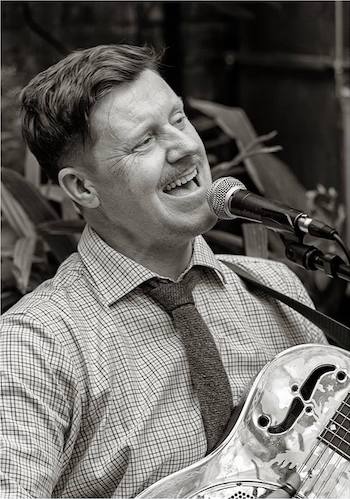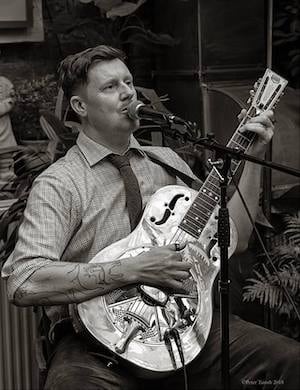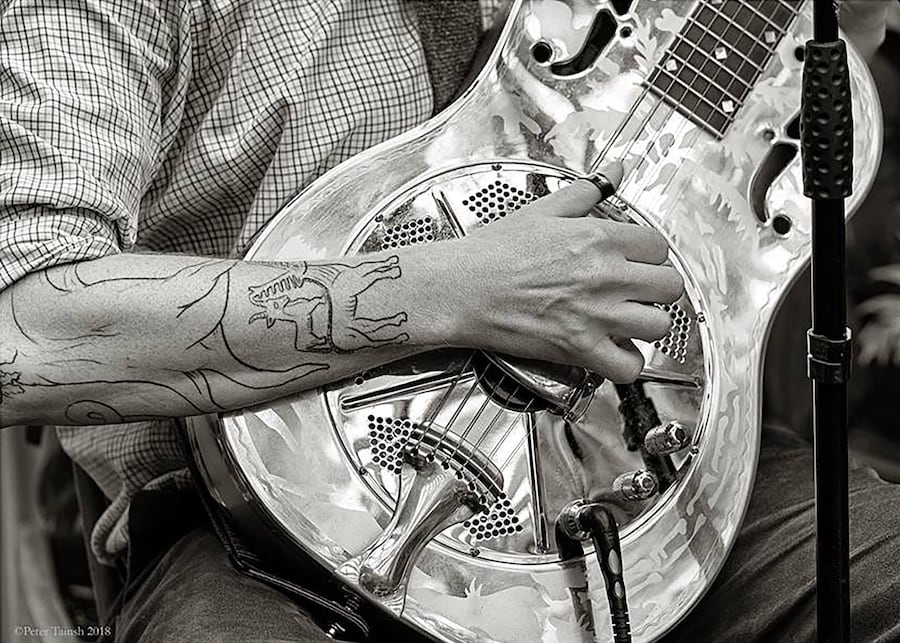Just over eighteen months ago George Nigel Hoyle – who records under the Cunning Folk moniker – spoke to Folk Radio about his album Ritual Land, Uncommon Ground: an eclectic and diverse showcase of his songwriting that drew inspiration from Steely Dan, Julian Cope and the nature writing of Robert MacFarlane. This month sees the release of a second Cunning Folk album, Constant Companion, a collection of wonderfully intimate songs, mostly from the folk tradition. It was recorded in live takes and demonstrates Hoyle’s talents as a sincere, lively performer and a staggeringly accomplished guitarist. He agreed to talk to us again about how and why he made it.
This album, with its focus on traditional material, is markedly different in conception and tone from last year’s record. So, what prompted the change of direction? For Hoyle, it seems it’s all about nurturing a deeper understanding of music through a connection with its older forms.

Hoyle has been playing for thirty years and his guitar, he says, has been a ‘constant companion’ – a theme reflected in the title of the new album. ‘Stripping down the production to live takes of myself and guitar, and performing songs which are traditional repertoire is a way of showing folk a sense of me as an artist.’
Talking about the influences on ‘Constant Companion’, he admits ‘Shearwater by Martin Carthy was certainly an influence. It’s my favourite Carthy record. I get a real sense of what he is about from that record.’ Like Carthy’s minimal 1972 masterpiece, Constant Companion seems to be a conceptually loose record, particularly in comparison with its predecessor. Whereas Ritual Land, Uncommon Ground was very much about our connections with place and landscape, this one seems less easy to pin down in terms of theme. If there is a concept at work here, Hoyle implies, it is a much more personal one: ‘I suppose I am exploring my relationship with traditional repertoire. The process of building a repertoire and arranging the songs to my sensibility has told me a lot about myself. The songs we choose tell us a lot about who we are. In the last few years I have done a lot of reading about the early 20th century English folk song collectors and the mid 20th century folk revivals and am starting to get an understanding of what cultural history really is. This landscape of ideas, folk memories, beliefs and political thought is subtle, intangible and fascinating.’
When I question how the songs on Constant Companion (and folk songs in general) relate to contemporary society, Hoyle is quick to point out that music doesn’t have an inherent duty to instruct or proselytise. Personal engagement with the material is paramount: ‘I made a record of traditional folk songs. People who like that sort of thing are more likely to like what I do. Folk music is vernacular, it’s everyday. This stuff is part of my everyday life. For someone who is into beats, or cosmic house, or math rock, or metal; that is their everyday music. The role of music is personal to whoever listens and plays it. For me traditional music and folk music is part of who I am, that’s why I do it. I don’t like didactic music but I do like music which helps you to think about the world and good folk music can do that. It’s fun too.’

When I put it to him that the audiences at folk clubs have changed over the years, and that folk music, in turn, might be changing from a working class to a middle-class form of expression, Hoyle explains that the situation is much subtler and more complex than that: ‘Traditional music has class running through it. In the Cecil Sharp era, predominantly middle-class collectors collected from working class singers. There was a bias against music hall so the singers who often had music hall songs in their repertoire did not sing them to the collectors. Nowadays a lot of people (but by no means all) who come to clubs and like the music are middle class. It’s traditional music, not necessarily modern vernacular music, it fulfils a different societal function now to what it did a hundred odd years ago. That’s fine. It is what it is. I run a folk festival in Bermondsey and I met a local Baptist minister in ALDI last week and he said to me “folk music: I love music hall.” Music hall has certainly found itself in the folk clubs more. It’s big in Bermondsey!’
Folk music is, in a way, defined by how it changes as much as by the traditions it adheres to, and Hoyle is well aware of this: ‘There was a folk music conference a few months back where one of the speakers demonstrated that some traditional songs had been adapted for the music hall in the 19th century then migrated back into the tradition. It’s all history.’
When we think of the great folk songs, we often attempt to identify ‘definitive versions’, but the constantly changing nature of music renders such attempts futile. Hoyle is content to live in the moment, and his songs sound all the fresher for it. ‘I just make sure I sing songs I love with arrangements I’m proud of. I’m a revivalist: I don’t come from a tradition. I choose what sings to me then sing it to other people.’ The result of this is that his songs are genuinely recognisably his: ‘I want to make sure that what I perform is me. I love the other versions; that’s often how I came to the songs in the first place, but when I want to hear Sweeney’s Men do Willie O Winsbury I’ll listen to that, when I want the Anne Briggs or the Richard Thompson I’ll listen to that. Hearing great people bring a song to life in their own way inspires me to have a go!’
For Hoyle, the ‘great people’ are by no means limited to the folk tradition. Alongside the likes of Carthy, Bert Jansch, Richard Thompson and Stick In The Wheel’s Ian Carter, he lists Jimmy Page, Toni Iommi and Puerto Rican virtuoso Carlos Alomar among his favourite guitarists. This is just one facet of his admirably open, inclusive stance on music making. Although he admits to being an avid student of the history of the songs he performs, he never falls into the trap of relying on that history. As he puts it, ‘I certainly spend a lot of time reading about the cultural history of music. I don’t look at the songs on their own; there are wonderful stories around the songs and the collectors. Traditional music is living history. I’m joining in.’
Constant Companion is Out Now: ProperMusic | Amazon
Live Dates
DECEMBER
Sat 08 – The Wanstead Tap, London (with Stick in the Wheel)
Mon 10 – Saturnalia At Atlantis, The Atlantis Bookshop, London
Wed 12 – London Album Launch Party, Shortwave Cafe, London
Fri 14 – Dorset Album Launch Gig, Eight Arch Brewing Company, Wimborne
Mon 17 – The Folklore Of Christmas: Cunning Folk Calendar Club, Shelverdine Goathouse, London
Fri 21 – Kartel Music Presents: Winter Solstice 2018 (Stick In The Wheel + Cunning Folk + Laura Smyth & Ted Kemp), Rough Trade East, London
Photo Credit: Peter Tainsh courtesy of the artist

